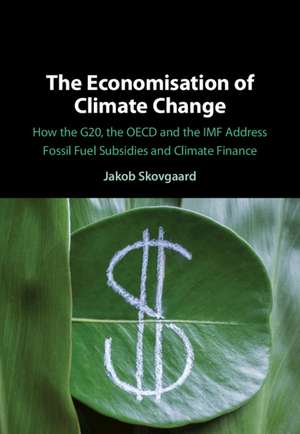The Economisation of Climate Change: How the G20, the OECD and the IMF Address Fossil Fuel Subsidies and Climate Finance
Autor Jakob Skovgaarden Limba Engleză Hardback – 24 mar 2021
Preț: 604.97 lei
Preț vechi: 679.74 lei
-11% Nou
Puncte Express: 907
Preț estimativ în valută:
115.76€ • 121.19$ • 95.78£
115.76€ • 121.19$ • 95.78£
Carte tipărită la comandă
Livrare economică 05-19 aprilie
Preluare comenzi: 021 569.72.76
Specificații
ISBN-13: 9781108492836
ISBN-10: 1108492835
Pagini: 300
Dimensiuni: 175 x 250 x 20 mm
Greutate: 0.67 kg
Editura: Cambridge University Press
Colecția Cambridge University Press
Locul publicării:New York, United States
ISBN-10: 1108492835
Pagini: 300
Dimensiuni: 175 x 250 x 20 mm
Greutate: 0.67 kg
Editura: Cambridge University Press
Colecția Cambridge University Press
Locul publicării:New York, United States
Cuprins
Preface; Part I. Introduction: 1. Introduction: The economisation of climate change and why it matters in the case of international economic institutions; Part II. Setting the Stage: 2. A framework for studying institutional output and its alignment, causes and consequences; 3. The three institutions, their roles and the environment; Part III. Fossil Fuel Subsidies: 4. Fossil fuel subsidies: Key issues; 5. The G20 and fossil fuel subsidy reform: The catalyst; 6. The OECD and fossil fuel subsidies: The knowledge provider; 7. The IMF and fossil fuel subsidies: The unexpected environmentalist; 8. The alignment of the economic institutions on fossil fuel subsidies: Synergies, but definitions can be divisive; Part IV. Climate Finance: 9. Climate finance: Key issues; 10. The G20 and climate finance: Introducing finance ministries to the topic; 11. The OECD and climate finance: Development and investment; 12. The IMF and climate finance: Carbon pricing rears its head; 13. The alignment of the economic institutions on climate finance: Efficiency in development and investments, but also carbon pricing; Part V. Conclusions: 14. Conclusions; References; Index.
Recenzii
'Skovgaard's excellent book explores how the IMF, OECD and G20 address the global threat of climate change and frame it as an economic issue. It provides a timely analysis of the increasing economisation of climate policy - its strengths and limitations. Most importantly, it shines a light on the questions of power and justice that are often hidden in economic discourses.' Robert Falkner, London School of Economics and Political Science
'Climate change can be reduced to the failure of the economic system to adequately recognize and price the short and long term benefits and costs of economic activity. After years of progress on climate change in the scientific, civil society, and environmental sphere, climate change is starting to become 'mainstreamed' by the G20, IMF, and beyond. While Skovgaard recognizes that in some ways permeation of core international economic institutions is paramount to tackling the climate challenge, he also shows how these institutions 'economize' climate change in a manner that may result in the fox guarding the henhouse. This book is essential reading for those wishing to trace the evolution of climate policy from scientific communities and civil society to the halls of economic power in order to help us understand the nature of the challenge for scholars and policy makers alike.' Kevin P. Gallagher, Boston University
'The need to shift the way finance operates is now widely recognized as essential for the societal transformations necessary to prevent dangerous climate change. Skovgaard's careful and sobering analysis shows both the power of three key global institutions - the IMF, G20, and OECD - to influence major financial reforms like ending fossil fuel subsidies, but also how their worldviews reinforce current practices that militate against the needed paradigm shift in climate finance. Anyone who wants to understand the opportunities and limits of these institutions' economization of climate change will want to read this book.' Steven Bernstein, University of Toronto
'Climate change can be reduced to the failure of the economic system to adequately recognize and price the short and long term benefits and costs of economic activity. After years of progress on climate change in the scientific, civil society, and environmental sphere, climate change is starting to become 'mainstreamed' by the G20, IMF, and beyond. While Skovgaard recognizes that in some ways permeation of core international economic institutions is paramount to tackling the climate challenge, he also shows how these institutions 'economize' climate change in a manner that may result in the fox guarding the henhouse. This book is essential reading for those wishing to trace the evolution of climate policy from scientific communities and civil society to the halls of economic power in order to help us understand the nature of the challenge for scholars and policy makers alike.' Kevin P. Gallagher, Boston University
'The need to shift the way finance operates is now widely recognized as essential for the societal transformations necessary to prevent dangerous climate change. Skovgaard's careful and sobering analysis shows both the power of three key global institutions - the IMF, G20, and OECD - to influence major financial reforms like ending fossil fuel subsidies, but also how their worldviews reinforce current practices that militate against the needed paradigm shift in climate finance. Anyone who wants to understand the opportunities and limits of these institutions' economization of climate change will want to read this book.' Steven Bernstein, University of Toronto
Notă biografică
Descriere
Discusses how G20, IMF and OECD have addressed climate finance and fossil fuel subsidies, including consequences for climate politics.
